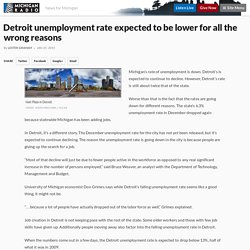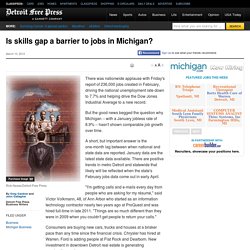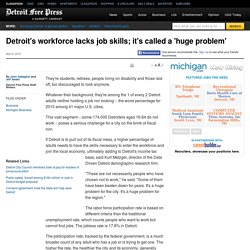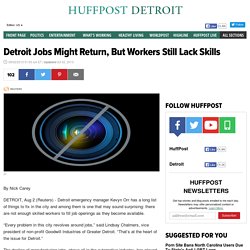

A retraining program that works: Finding jobs in Detroit. In the aftermath of Detroit's historic bankruptcy, attention will turn quickly to a much more troubling problem than the city's balance sheet: the crisis of structurally unemployed residents in Detroit.

For a true turnaround, the city must put people back to work — but simply prescribing a quick fix would ignore the deeply rooted problems in the labor force, including a lack of modern job skills, rampant illiteracy, transit problems and a fundamental lack of opportunities. The resurgence of downtown and Midtown Detroit is creating jobs for high-tech workers with advanced degrees and spurring new real estate developments aimed at young educated professionals. Detroit unemployment rate expected to be lower for all the wrong reasons.
Michigan’s rate of unemployment is down.

Detroit’s is expected to continue to decline. However, Detroit’s rate is still about twice that of the state. Living On Minimum Wage Is Hardly Living At All Last week, I tried living on just $42 worth of groceries.

The endeavor was part of the "Minimum Wage Grocery Challenge," where state legislators across the country are learning what it's like to face the hardships working families face every day. According to the Department of Agriculture, a single male with no children living on minimum wage can expect to spend approximately $6 per day on groceries, if he goes with the thriftiest options available. So that's precisely what I did. I will be the first to tell you that it was nearly unlivable. Detroit unemployment rate climbs, highest among large cities - Oct. 28, 2009. NEW YORK (CNNMoney.com) -- Detroit continued to lead the nation's cities of 1 million people or more with the highest unemployment rate in September, according to government figures released Wednesday.
And for Detroit's painful unemployment rate to stabilize and eventually decline, economists say the jobless will just have to leave the Motor City. The Labor Department said the metro area ravaged by the auto industry's collapse reported a 17.3% jobless rate in September, up from 17% in August, and 8.9% last year. Detroit also recorded the largest jobless rate increase from September 2008 with 8.4 percentage points, followed by Muskegon-Norton Shores, Mich., at 6.8 percentage points. Detroit unemployment rate expected to be lower for all the wrong reasons. Detroit Unemployment. Is skills gap a barrier to jobs in Michigan? There was nationwide applause with Friday's report of 236,000 jobs created in February, driving the national unemployment rate down to 7.7% and helping drive the Dow Jones Industrial Average to a new record.

But the good news begged the question why Michigan -- with a January jobless rate of 8.9% -- hasn't shown comparable job growth over time. A short, but important answer is the one-month lag between when national and state data are reported. January data are the latest state data available. There are positive trends in metro Detroit and statewide that likely will be reflected when the state's February jobs data come out in early April. "I'm getting calls and e-mails every day from people who are asking for my résumé," said Victor Volkmann, 48, of Ann Arbor who started as an information technology contractor nearly two years ago at ProQuest and was hired full-time in late 2011.
Consumers are buying new cars, trucks and houses at a brisker pace than any time since the financial crisis. Detroit Skills Gap Report. Op-ed: Orchestrating Detroit's Comeback: Closing the Skills Gap. High school graduation was staring Gregory Davis in the face and he didn’t know what he wanted to do after the big day came.

Working a minimum wage job wasn’t the right path, and yet college was a distant thought. Compounding his problem was the daunting challenge of finding a good job in Detroit – a city hit hard by the recession that only now is really starting to recover. Davis began exploring his options by taking classes at Focus: HOPE, a Detroit nonprofit organization that provides machinist training for the jobs that are currently in high demand by area manufacturing employers. Its Machinist Training Institute not only taught Davis the skills he needed to land a good paying manufacturing job, but it has paved the way for a possible future career. [OPINION: Lack of Skilled Workers Threatens Economic Growth in STEM Fields] At its worst, Detroit saw the official unemployment reach 15 percent, disproportionately impacting low-income and low-skill residents.
[ALSO: U.S. Chase pushes job training in health care, manufacturing. JPMorgan Chase, as part of its five-year $100-million investment in Detroit, is releasing a report today detailing a skills gap in metropolitan Detroit and suggesting ways to bolster workforce development in the region.

Chase found that 6,000 jobs in health care and manufacturing will open up annually between now and 2018 in metropolitan Detroit. But many area residents lack the basic academic and job readiness training to take advantage of these well-paying job opportunities. As a result, middle-skill job postings in health care and manufacturing go unfilled for over a month on average. With this data, Chase is working with community partners like Focus: HOPE and Macomb Community College to expand workforce development and training programs. Detroit's workforce lacks job skills; it's called a 'huge problem' They're students, retirees, people living on disability and those laid off, too discouraged to look anymore.

Whatever their background, they're among the 1 of every 2 Detroit adults neither holding a job nor looking -- the worst percentage for 2010 among 41 major U.S. cities. This vast segment -- some 174,000 Detroiters ages 16-64 do not work -- poses a serious challenge for a city on the brink of fiscal ruin. If Detroit is to pull out of its fiscal mess, a higher percentage of adults needs to have the skills necessary to enter the workforce and join the local economy, ultimately adding to Detroit's income tax base, said Kurt Metzger, director of the Data Driven Detroit demographic research firm. "These are not necessarily people who have chosen not to work," he said. "Some of them have been beaten down for years. The labor force participation rate is based on different criteria than the traditional unemployment rate, which counts people who want to work but cannot find jobs.
Detroit Jobs Might Return, But Workers Still Lack Skills. DETROIT, Aug 2 (Reuters) - Detroit emergency manager Kevyn Orr has a long list of things to fix in the city and among them is one that may sound surprising: there are not enough skilled workers to fill job openings as they become available.

“Every problem in this city revolves around jobs,” said Lindsay Chalmers, vice president of non-profit Goodwill Industries of Greater Detroit. “That’s at the heart of the issue for Detroit.” The decline of manufacturing jobs, above all in the automotive industry, has played a major role in the slide of the Motor City’s population to 700,000 from a peak of 1.8 million in the 1950s. Despite recent gains, Michigan has 350,000 fewer manufacturing jobs than in 2000. Seismic shifts in the local labor market have left many unskilled workers behind.